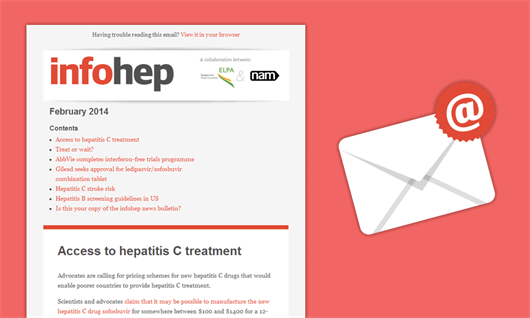Merck has received a US license
for its direct-acting antiviral combination of grazoprevir and elbasvir, to be
marketed as Zepatier. The
combination of grazoprevir (an HCV protease inhibitor) and elbasvir (an NS5A
inhibitor) is dosed once daily for 12 weeks or 16 weeks with or without
ribavirin.
The
combination has been approved for the treatment of genotypes 1 and 4. Approval
is based on results of studies in previously untreated and treatment-experienced patients. It has not been approved for
use in people with moderate or severe hepatic impairment (Child Pugh B or C
stages).
A
12-week treatment course is recommended for all patients apart from those with
genotype 4 who have previous experience of pegylated interferon and ribavirin,
or people with genotype 1a and baseline NS5A mutations indicating possible
resistance to NS5A inhibitors. These groups of patients should receive a
16-week course of treatment.
Use in
combination with ribavirin is recommended for the following groups of people:
Genotype 1a: previously untreated people and people previously treated
with pegylated interferon and ribavirin if they have baseline NS5A mutations
indicating possible resistance to NS5A inhibitors
Genotype 1a and 1b: people previously treated with pegylated
interferon, ribavirin and a protease inhibitor (boceprevir, simeprevir or
telaprevir)
Genotype 4: people previously treated with pegylated interferon and
ribavirin.
Testing
for NS5A resistance-associated polymorphisms (positions 28, 30, 31 or 93) is
recommended for GT1a-infected patients prior to starting treatment.
Merck
has priced its regimen at a list price of $54,600, significantly below the list
price established for its chief competitor product, Gilead’s Harvoni (sofosbuvir/ledipasvir). Merck’s price compares with a list
price of $94,500 for Harvoni in the United States, although Gilead is believed
to have agreed discounts of up to 30% with many insurers.
The European
Medicines Agency is reviewing a licensing application for the combination and a
decision is expected in 2016.
Merck
is also developing a three-drug pangenotypic regimen. Results of the C-CREST trial, presented at The Liver Meeting in November
2015, showed
that an 8-week treatment course with a combination of grazoprevir, the NS5A
inhibitors elbasvir or MK8404, and the experimental nucleotide polymerase
inhibitor MK-3682, taken for 8 weeks, cured more than 90% of hepatitis C
patients without cirrhosis with genotypes 1, 2 or 3. Based on the results from
this initial trial, Merck indicated in a press release that it has initiated a further
study of grazoprevir (100mg), MK-3682 (450mg), and MK-8408 (60mg) in Part B of
the C-CREST phase 2 clinical development programme.



Connect with infohep on Facebook: Keep up to date with all the latest news and developments.
Follow infohep on Twitter for links to news stories and updates from infohep.org. Follow us at www.twitter.com/infohep.
Follow all the infohep news by subscribing to our RSS feeds.